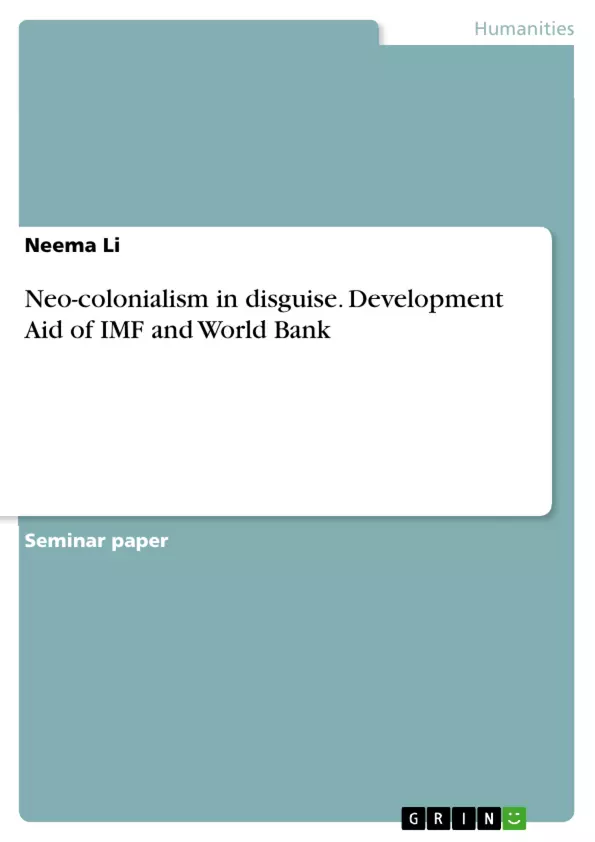The development aid can be traced back to strategic and historical donor considerations. Aside from vastly expanding the arena of ideological rivalry during the cold war, the 1940s saw the beginning of the independence movement among former colonies. Independence encouraged new donors to build aid programmes as a continuation of their colonial obligations in the 1950s. In the 1960s, the principal donors agreed to set up the International Development Association (IDA) under the control of the World Bank, which was quickly established as financially the most significant source of concessional assistance. As the World Bank, the International Monetary Fund (IMF) is an institution of the UN system, which shares the same goal of raising living standards in their member countries and focusing on long-term economic development and poverty reduction.
Development aid is, besides the colonial debt, often legitimized by the humanitarian obligation to help the people in need and thereby allows aid institutions to work almost unquestioningly and unproblematically in so called developing countries. The designation of ‘development’ as ‘good’ with the differentiation of the ‘bad colonialism’ seems to bear no resemblance to the perceived inequalities and exploitations of empire. But the ‘new imperialism’ can already be recognized in the designation ‘development’. The concept of ‘development’ conveys a hierarchy of the world through the juxtaposition of ‘developed’ and ‘underdeveloped’ and a power asymmetry through the unequal share of resources for development.
Inhaltsverzeichnis (Table of Contents)
- Introduction
- Better Development Through Better Policy?
- Modernization Theory
- Dependency Theory
- Neoliberalism and Market Development
- Lessons Learned?
- Poultry Imports in Ghana – Prevention or Production of Poverty?
- The Economic Partnership Agreement (EPA) - Hope for change?
- Conclusion
Zielsetzung und Themenschwerpunkte (Objectives and Key Themes)
This paper aims to analyze the mechanisms of neo-colonial rule disguised as development aid by the IMF and World Bank. It examines how development theories and practices, particularly in Africa, perpetuate power imbalances and exploitation.
- The historical evolution of development aid and its connection to colonialism
- The role of development theories (modernization, dependency, and neoliberalism) in shaping development practices
- The impact of IMF and World Bank policies, particularly Structural Adjustment Programs (SAPs), on developing countries
- The critique of development aid as a tool for neo-colonialism
- The ongoing debate about the effectiveness and legitimacy of development aid
Zusammenfassung der Kapitel (Chapter Summaries)
- Introduction: This chapter explores the historical roots of development aid, tracing its origins to colonial legacies and Cold War politics. It introduces the key actors, the IMF and World Bank, and highlights the problematic nature of the "development" discourse, which reinforces a hierarchical worldview.
- Better Development Through Better Policy?: This chapter examines three major development theories: modernization theory, dependency theory, and neoliberalism. It analyzes their underlying assumptions, critiques, and the power imbalances inherent in each approach.
- Lessons Learned?: This chapter presents two case studies to illustrate the practical implications of development theories and policies. It analyzes the poultry import industry in Ghana and the Economic Partnership Agreement between Europe and West Africa, highlighting the complex dynamics of development aid and its potential pitfalls.
Schlüsselwörter (Keywords)
The paper focuses on key terms and concepts such as development aid, neo-colonialism, IMF, World Bank, modernization theory, dependency theory, neoliberalism, Structural Adjustment Programs (SAPs), poverty reduction, inequality, globalization, and power dynamics. These terms reflect the primary themes and research focus of the paper.
How is development aid linked to neo-colonialism?
The paper argues that development aid often serves as a continuation of colonial obligations and strategic donor interests, perpetuating power asymmetries between "developed" and "underdeveloped" nations.
What role do the IMF and World Bank play in this context?
As part of the UN system, these institutions focus on long-term economic development but are critiqued for using tools like Structural Adjustment Programs (SAPs) that can reinforce exploitation.
What is the "new imperialism" mentioned in the text?
It refers to the hierarchical worldview created by the "development" discourse, which justifies intervention in developing countries under the guise of humanitarian obligation.
Which development theories are analyzed in the paper?
The essay examines Modernization Theory, Dependency Theory, and Neoliberalism, analyzing how each approach influences development practices and power dynamics.
What real-world examples are used to critique development aid?
The paper presents case studies on poultry imports in Ghana and the Economic Partnership Agreement (EPA) to illustrate how aid policies can sometimes produce rather than prevent poverty.



